Research and Outreach
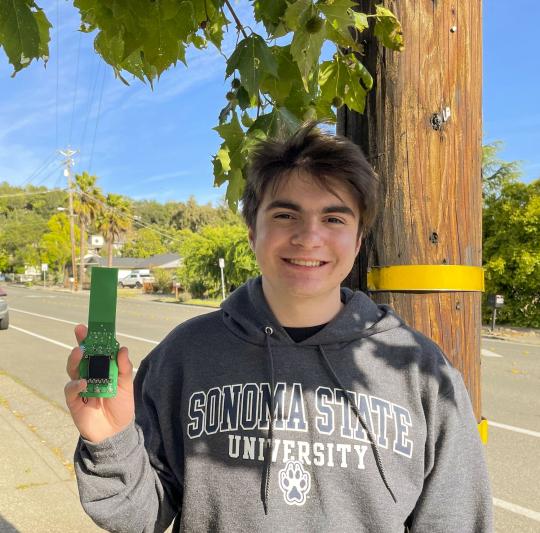
Students and faculty in the Engineering Department engage in cutting-edge application-centric research initiatives. All of the research taking place in the department is led by undergraduate and graduate students. They are in charge of research projects, plan and do research, give talks at conferences, write articles for journals, and compete in regional and national design challenges. We put students' success at the center of our research and scholarly activities. We invite you to learn more about our research and scholarly activities and to join us for research talks and seminars.
Pictured undergraduate EE student Andrew Wolfe shows a printed circuit board for a low-cost ambient high-frequency radio power sensor he made in the Electrodynamics Engineering Lab. Andrew’s research won the first prize in the 36th Annual CSU Student Research Competition.
Core Research Areas:
Electromagnetics and Radio Frequency Communications
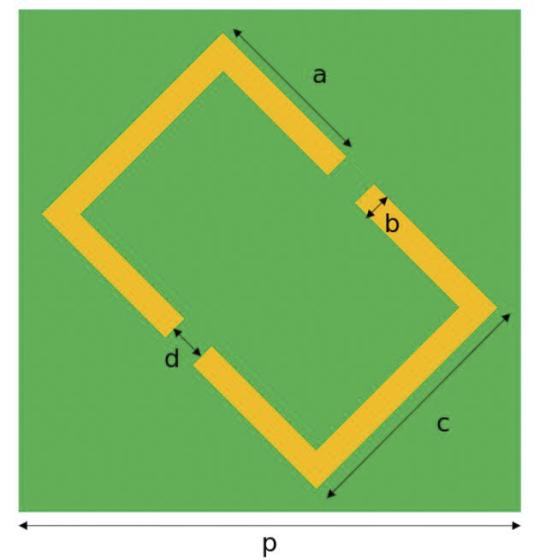
Projects in Electromagnetics and Radio Frequency Communications look into electromagnetics, radio frequency, and microwave. Some researchers learn more about metamaterials and metasurfaces, while others look into how electromagnetic waves travel and interact with each other. Some researchers are coming up with new ways to process signals for the next generation of communication systems. For example, they are trying to improve wireless communication in crowded indoor environments and make sure that a small ceramic antenna works as well as a larger one. Some researchers are looking into using small radio signals for search and rescue operations. Researchers make electronic boards for microwaves, design and make antennas, and test them with high-tech tools.
Pictured the double U-shaped PR metaparticle was developed by graduate ECE student Joseph Haun and Dr. Mohamed Salem in the Electrodynamics Engineering Lab. Joseph won the Bright Idea Award for this project at the SSU Research Symposium.
Robotics and Automation
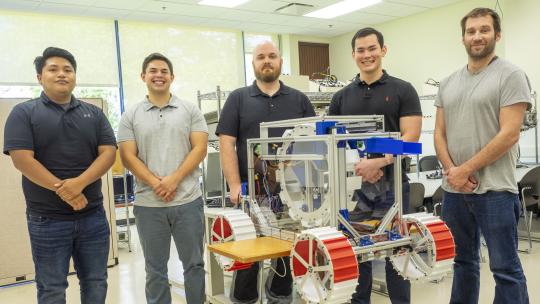
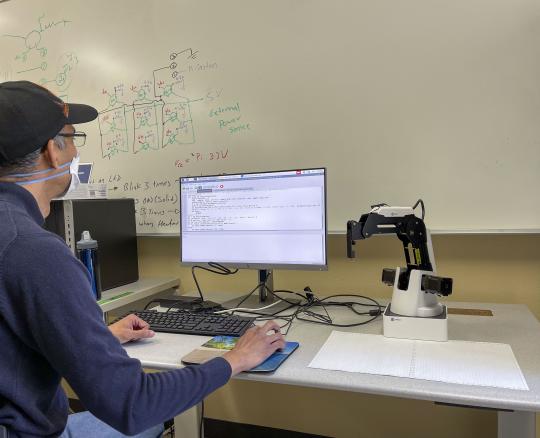
Robotics research and design projects look at robots and self-running systems that can be used in a wide range of places, from the home to the factory to outer space. Some examples of projects are a NASA Lunabotics rover for exploring the moon, unmanned aerial vehicles that can land on their own and charge themselves wirelessly, mobile robots that can find their way around with the help of vision and audio commands, and fixed robotic arms with advanced control software. Researchers build robots, create electronic hardware, and write software.
Picture 1 - The SSU Lunabotics team poses with their version-1 rover in the Engineering Senior Design Laboratory. They competed in the NASA Lunabotics competition and were ranked 28 out of 78 teams that participated nationally. The team works with Dr. Nansong Wu in the Advanced Robotics Lab.
Picture 2 - Graduate ECE student Roel Hernandez gives a final touch to his robot arm control software in the Intelligent Systems Lab before the demonstration to a group of high school students.
Internet of Things

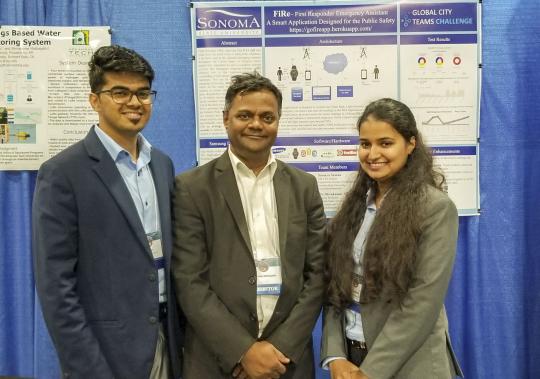
Researchers working on the Internet of Things explore the world of connected things and how to make them efficient, reliable, and safe. Some researchers are looking into developing solutions to social, educational, and healthcare problems. An example of such a project is a green network that uses delay-tolerant networking for universal connectivity in rural areas. Researchers connect sensors to microcontrollers, write software to collect and study sensor data, and create interfaces to use the data.
Picture 3 - Undergraduate EE students demonstrate smart greenhouse technology at the Petaluma Bounty Farm, Petaluma, CA. The group worked with Dr. Farid Faramand in the Advanced Internet Technology in the Interest of Society Lab.
Picture 4 - Graduate ECE students Geof Thomas and Saumya Saxena with their mentor Shivakumar Mathapathi at a Global City Teams Challenge (GCTC) Expo held in Washington DC.
Intelligent Systems

Researchers are building hardware and software systems that work intelligently. These systems use vast amounts of data from sensors, cameras, and other sources to learn from their experiences. They use machine learning, artificial intelligence, and powerful small computers. Some researchers are looking into creating new medical devices, while others are making robots and drones smarter so that they can do new things and make decisions much faster. Some examples of these kinds of projects are robot control and navigation based on artificial intelligence, FPGA implementation for metaparticle surrogate modeling, drone navigation and self-landing, a grape yield estimator, and figuring out how much glucose is in a person's blood from their breath.
Research Laboratories
The Advanced Internet Technology in the Interests of Society Laboratory (AITIS Lab)
AITIS Lab is committed to research and develop Internet-based technology solutions for social, educational, environmental, and health care problems. Our research activities include Green Networking and Implementing Delay Tolerant Networking to promote universal connectivity to rural areas. For more information, please contact Dr. Farid Farahmand.
Electrodynamics Engineering Laboratory (eel)
The electrodynamics engineering laboratory (eel) is established at Sonoma State Engineering Department to advance research in electromagnetic wave propagation and scattering, antenna design, novel electromagnetic materials, microwave circuit design, and real-time signal processing techniques. For more information, please contact Dr. Mohamed Salem.
Intelligent Systems Laboratory (ISL)
The mission of the Intelligent Systems Lab (ISL) at Sonoma State University is to advance research and teaching in smart and intelligent systems as applied to biomedical sensing, embedded systems, computer vision, and robotics. We work with sensors and analyze sensor data to solve engineering problems through design, development, test, and verification of hardware and software. For more information, please contact Dr. Sudhir Shrestha.


